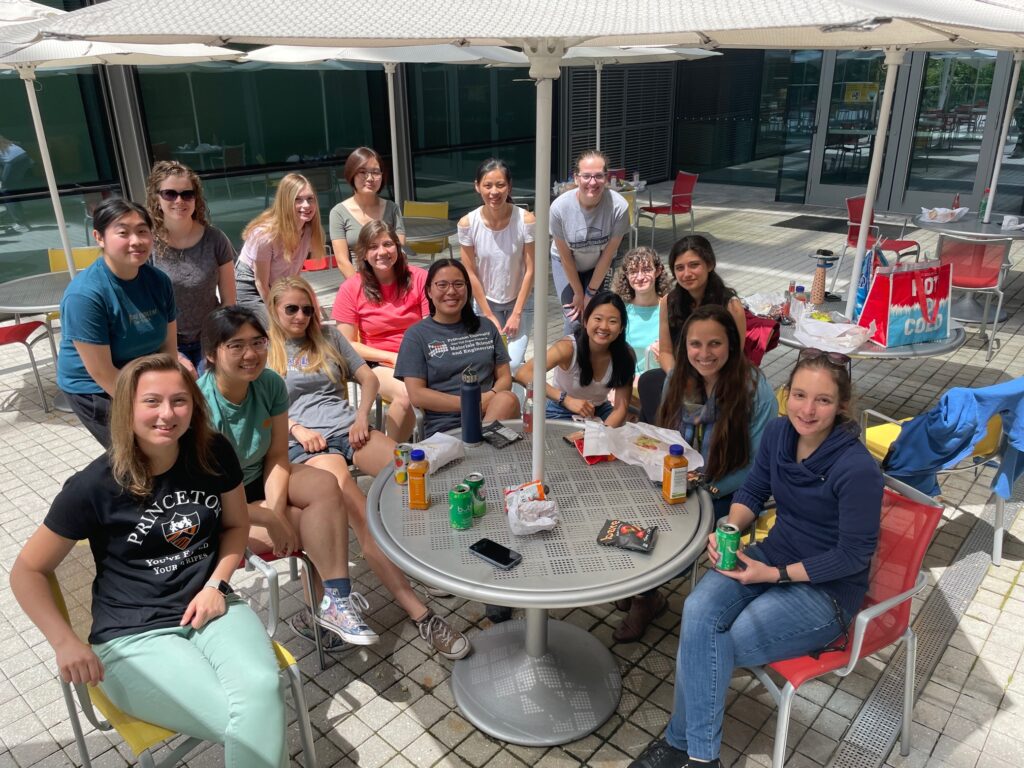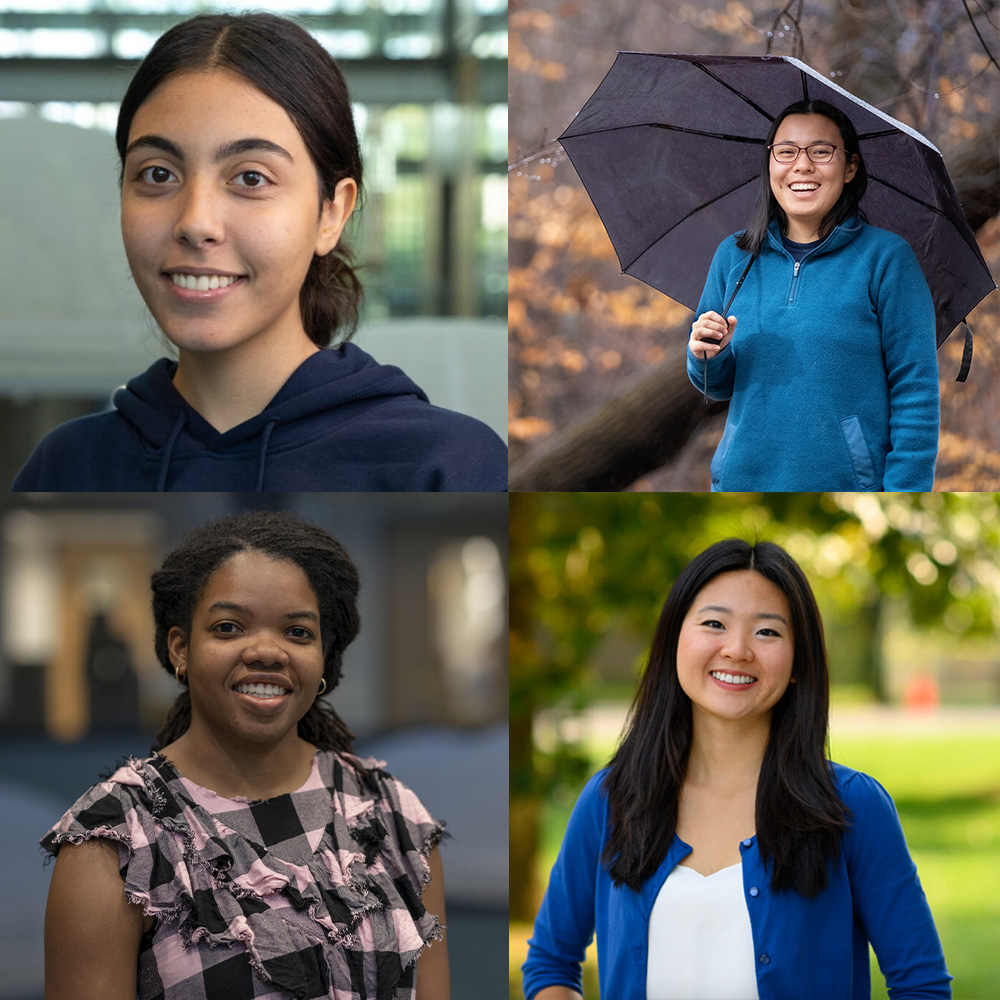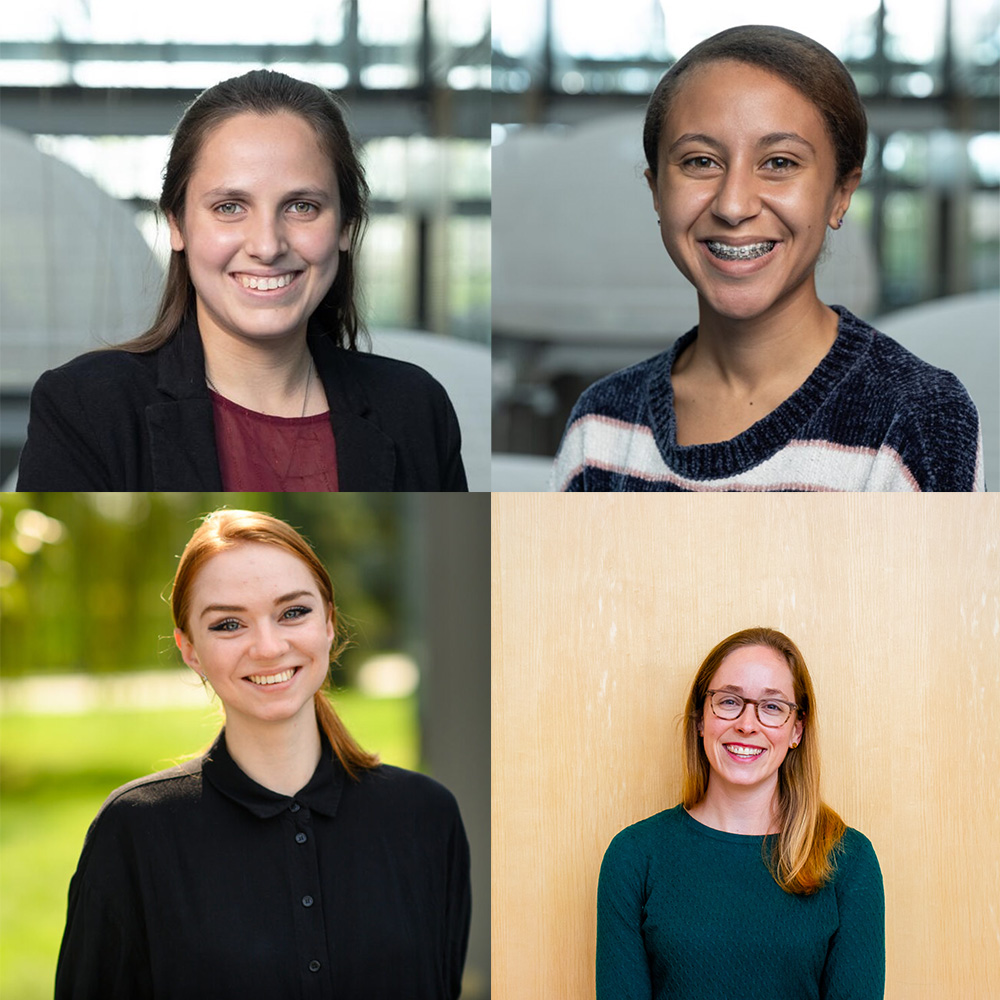Meet (some of) the Women of Chemistry

The Department of Chemistry honors the cultural, political, and scholarly achievements of women around the globe celebrated on International Women’s Day, today, March 8.
As a way to mark IWD 2023, we asked eight of our graduate students and postdocs to provide a brief synopsis of their work and their reasons for pursuing it. Their answers, reflective of the depth of talent among all scholars in the Department, are featured below.
Negar Baradaran (Graduate Student, Weichman Lab)
My research:
My research at Princeton involves using frequency comb spectroscopy to take fully resolved spectra of complex molecules, such as C60. The goal of my research is to help detect the spectra of astrochemical species that have not been yet recorded in the laboratory. Since joining the Weichman Lab, I have been designing and building a gas-cell chamber to cool down the molecules for our experiment.
My reasons:
I have always been curious about light matter interaction, which is why I chose to do spectroscopy research in graduate school. What I love about my research is that it allows for a complete understanding of the fullerene composition of astrochemical environments, which leads to a better understanding of the universe.
Isabelle Tigges-Green (Graduate Student, Scholes Group)
My research:
I love doing attosecond spectroscopy because the field, the community in attosecond physics and spectroscopy, is incredibly fun. The discussions I’ve had with colleagues and fellow researchers have been incredibly exciting and enlightening. It’s just an amazing field to be working in. I loved the conference I went to in July, where I gave a poster presentation and it was so much fun.
My reasons:
I don’t like being bored. If I think about what brings me a lot of joy in life and what’s meaningful, it’s interesting and engaging conversations with friends and colleagues. I also like to feel I’m being productive and discovering something new and learning new things. I can combine all of that in doing science. I can say that I’m having a lot of fun and be totally genuine about it. Through all my interactions and the support I’ve gotten from my group members, I’ve never felt disappointed or unhappy. It’s just been a great experience.
Amy Chan (Graduate Student, MacMillan Lab)
My research:
My research in the MacMillan Lab focuses on employing Earth-abundant first-row transition metals in photoredox catalysis. The goal is two-fold: 1) to better understand the photo-induced physicochemical properties of these metals as catalysts, and 2) to harness what we learn about these catalysts for highly desirable yet elusive bond formations that can provide access to molecules with significant importance in drug discovery and beyond.
My reasons:
My ultimate goal is to improve the lives of others, be it by enabling new life-saving treatments through novel methodology development or by providing alternatives to precious metals in drug development. The research I do provides me with the opportunity to accomplish these goals. That is ultimately what motivates me, and why I love what I do.
Brooke Johnson (Graduate Student, Mo Lab)
My research:
Our lab is broadly interested in discovering new natural products and enzymatic reactions, and uncovering how those novel products and reactions are generated. My research specifically focuses on elucidating novel enzymatic reactions that are involved in natural product biosynthesis from species that play critical roles in human health. It is both a humbling and exhilarating experience to be able to utilize an array of different techniques to discover nature’s secrets alongside my colleagues.
My reasons:
Why do I do this? Wow, has the answer to this question evolved! When I started my Ph.D., I did this because I was curious and wanted to do cutting-edge scientific research, and I wanted a career in teaching. After the pandemic and the murder of George Floyd, I discovered I am also very passionate about racial justice and theology. I am still the same curious person who loves to teach, but now I am doing this to see how I can teach students to bring themselves into their science and to think critically about how science can be used to help create a more just future.

Our featured chemists include, (from top left, clockwise): Negar Baradaran, Isabelle Tigges-Green, Amy Chan, and Brooke Johnson.

Our featured chemists include, (from top left, clockwise): Ashley Fidler, Dali Davis, Caroline Bartman, and Katherine Burton.
Ashley Fidler (Postdoctoral Researcher, Weichman Lab)
My research:
I am a physical chemist interested in harnessing light to control chemical reactions via the emerging field of polaritonic chemistry. Polaritons, or hybrid states with characteristics of both light and matter, are generated by enclosing a chemical system within an optical cavity composed of two mirrors. When one of the cavity modes is resonant with a transition between molecular energy levels, strong light-matter coupling generates two new polaritonic states, separated in energy by the Rabi splitting, as well as a manifold of optically dark states. Strong coupling has already been shown to modify chemical reactivity, but the mechanism remains unclear. In the Weichman lab, I utilize ultrafast spectroscopy to investigate the impact of strong light-matter coupling on the kinetics of benchmark, condensed-phase chemical reactions in optical microcavities. Through this work, we aim to not only better understand chemical reactivity under strong coupling but also to develop facile methods for controlling reactions that can be applied in a diverse array of synthetic systems to generate desirable products while reducing waste.
My reasons:
I am excited to perform this research because I firmly believe in the power of fundamental, mechanism-based research to revolutionize chemistry, and thereby transform society for the better.
Dali Davis (Graduate Student, Groves Group)
My research:
I work on the oxidation of organic substrates using an unspecific peroxygenase from the fungus Marasmius rotula (MroUPO). I have worked on alkanes with unactivated C-H bonds; however, my current focus, which has both environmental and synthetic applications, is on the oxidative transformation of the amino group on anilines to a nitro product under mild conditions in an aqueous solvent.
My reasons:
One of my favorite parts about my research is how interdisciplinary it is. I have always loved multiple areas of science, and it was a goal of mine to bring them together. My belief is that the most interesting science occurs at the interface of different fields because each brings a new perspective and way to tackle an issue. Without biology, I wouldn’t be able to culture my organism and purify my protein. Without chemistry, I wouldn’t be able to run my experiments. And without geoscience, I wouldn’t have the environmental viewpoint that I do for my project. I truly feel lucky to be able to explore and research a topic that ties my scientific interests together because it makes even the most challenging days feel worth it.
Caroline Bartman (Postdoctoral Researcher, Rabinowitz Lab)
My research:
During my postdoc, I discovered that tumors make and use energy slower than most healthy tissues. To measure tumor energy metabolism, I developed new techniques to measure the rates of glycolysis and the TCA cycle, the two energy-producing metabolic pathways.
My reasons:
My work allows me to address big questions in biomedicine while working with brilliant colleagues—even when experiments fail, it is always interesting. It is also inspiring to get to be a scientist, which allows me to follow in the path of so many amazing past scientists, including many inspiring women scientists, and hopefully getting a chance to train and pass the torch to the next generation of scientists after me.
Katherine Burton (Graduate Student, MacMillan Lab)
My research:
With a particular interest in methodology and catalysis development, we seek to apply our research technology towards advancement of modern pharmaceutical compounds. Currently, my research centers on the development of novel bioisosteres and functionalization modes to access drug-type molecules. Our strategy is engineered to improve the pharmacokinetic profile of pharmaceutically relevant compounds via calculated engagement of topologically three-dimensional building blocks. We seek to establish unprecedented means of rapidly assembling chemical diversity, thus widening the chemical space available in the advance research and discovery of lead compounds.
My reasons:
Suffering is an inherent part of life. However, I submit that bearing witness to human suffering instills an unyielding interest in the development of methods to alleviate pain and treat disease. We have all been touched by the positive impacts of pharmaceutical and radiological intervention on the alleviation of pain and malady in loved ones. I acknowledge with immense gratitude the sacrifice and perseverance of antecedent chemists and natural scientists responsible for developing these modes of treatment. It is with this same fervor that I have dedicated my life to research in organic synthetic chemistry, and found a bedrock in the MacMillan Lab at Princeton University.
Princeton Women in Chemistry is an advocacy, tutoring, social, and professional network for women in the Department of Chemistry.
